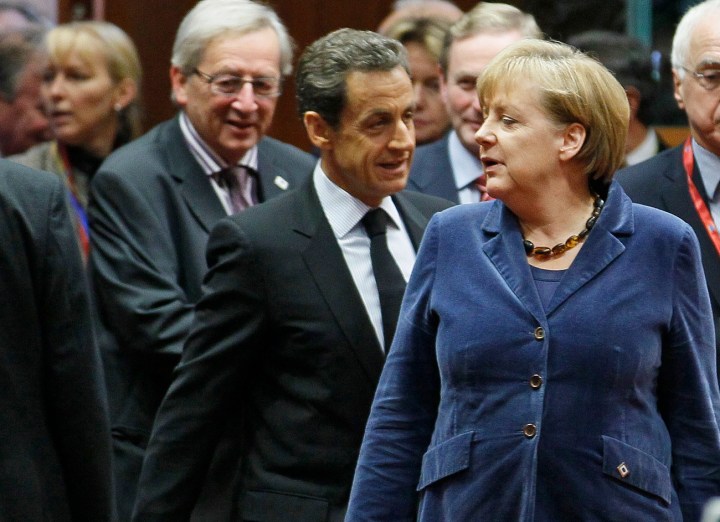Politics
Eurozone avoids head-on crash, for now

It must have been quite a sight – all those European leaders sitting and sitting and arguing and arguing until 4am until an agreement was reached on how to bring stability to the eurozone. But some fancy footwork and heavy lifting is still left to be done, reports J BROOKS SPECTOR.
All over Europe – briefly at least – bankers have stopped contemplating the end of civilisation as we know it and children have ceased being frightened by things that go bump in the night, that hide in the deep recesses of closets and live in the dank shadows under the bed frames. Unless, of course, you are one of those increasingly beleaguered holders of Greek government bonds. If you are that person or that bank, then you, my friend, have become the sacrificial lamb on the altar of euro stability, avoiding a double dip recession and warding off the collapse of the European financial universe. Maybe you should have bought those nice safe public utility bonds your broker recommended for uncertain times after all.
After being locked in their meeting room until close to sunrise, the European leaders came out, blinking in the pre-dawn early morning, to announce, as Nicolas Sarkozy said, “We have reached an agreement, which I believe lets us give a credible and ambitious and overall response to the Greek crisis. Because of the complexity of the issues at stake, it took us a full night. But the results will be a source of huge relief worldwide.” And German Chancellor Angela Merkel added “I believe we were able to live up to expectations, that we did the right thing for the eurozone, and this brings us one step farther along the road to a good and sensible solution.” It must have been quite a sight – all those heads of government sitting and sitting and arguing and arguing until 4am.
The basic elements of the deal included a 50% haircut of the value of Greek bonds, bolstering of the region’s banks so they could weather the hit from the semi-default of the Greek government, and a substantially augmented treasure chest for the European Financial Security Facility to the level of $1.39 trillion. All of these elements were designed to bolster Europe’s ability to calm the continuing market turmoil.
In part, this EFSF augmented fund will deal with Greece’s problems, but it will also serve as a firewall to keep much larger economies, like the Italy’s and Spain’s, from being dragged into the fire as well. These decisions came after months of foot-dragging in the face of growing global pressure to do something serious to prevent the ongoing crisis from pushing Europe and the rest of the developed world into the feared double dip recession – and to protect the eurozone common currency area from splintering apart.
As far as Italy was concerned, Premier Silvio Berlusconi had come under intensifying pressure to come to the meeting with a detailed economic reform plan for his country so as placate his euro partners. As a result, among other points, he promised to increase the retirement age of all Italian workers to 67 by 2026. Analysts say Berlusconi’s promise to the other leaders means that at least for now, he has a victory over his eurosceptic coalition partner Umberto Bossi, head of the Northern League.
A key aspect of the just-announced plan was to push overall Greek debt to “only” 120% of GDP by 2020. But, without the settlement, it was estimated its debt would have reached a totally untenable 180% by the end of the decade. The Institute of International Finance, the body that has been in the fray on behalf of banks, says it is committed to sorting things out with the banks in agreement with the “haircut” – but must get all those private bondholders to fall in line. Expect ructions. The IIF said this 50% level equals a contribution of $139 billion to this second Greek rescue and this now comes on top of the eurozone’s promise to spend $42 billion in guaranteeing the remaining value of the new bonds.
But, like everything else, the devil resides in the details and the multi-pronged approach’s effectiveness will ultimately be in those details, many of which still remain to be sorted out. Watch for many more meetings and a whole litany of false starts and hiccups before everything is in place finally. Signaling such caution, Heather Conley, director of the Europe program of the Center for Strategic and International Studies, a noted Washington think tank, said, “Will the sound of one trillion euros do the trick and ‘wow’ the markets or will the markets perceive this as smoke and mirrors? If the past two years has told us anything, it never appears to be sufficient.” Keeping Mammon well fed is never easy.
If the planned schedule falls in line, the program should be finalised by December, as investors swap their old bonds (the certificates will look pretty, framed and hung next to those beautifully engraved Czarist railway bonds) for new ones in January. That would make it official that Greece wins the race to be the first eurozone country to have defaulted on its debt, albeit in a controlled, negotiated, powered-flight fall from grace.
In recognition of all of this churning about, Greek PM George Papandreou said “We can claim that a new day has come for Greece, and not only for Greece but also for Europe. Let’s hope the worst is over.” Greece, of course, has been through tough months as proposed austerity measure after austerity measure has generated corresponding wave after wave of civil unrest and protest – government salaries and benefits have been hit, civil servants have been told to expect pink slips and new levies and taxes have been passed to bolster the anemic tax revenues now received by the Greek government. In fact, to cover its routine expenditures, for the past almost year and a half, Greece has basically been kept alive with ad hoc rescue loans of around $150 billion from eurozone nations and the IMF, since it could no longer go to international financial markets to borrow money. Well, would you lend money to the Greek government? Well, nobody else wanted to either.
Back in July the same governments and multilateral financial institutions had agreed on a new Greek loan of 109 billion euros, but financial and economic analysts had criticised this earlier promise as insufficient to do the job. Under the new agreement, beyond the euro 30 billion in bond guarantees, the region’s leaders – plus the IMF – now say they will provide another €100 billion in new loans.
But, because banks will have to come up with some of this, there were growing worries that the banks needed more reserves in their rainy-day funds to cushion any losses, so the European leaders have asked the banks to raise $148 billion by June 2012. Now where they get that money from will be interesting to watch. Or as veteran investment banker Gavyn Davies wrote in Thursday’s Financial Times:
In typical European fashion, a summit deal which seemed out of reach at midnight last night was triumphantly unveiled at 4am. The deal does not, and was not intended to, have any effect on the core problems facing the eurozone. There is still an urgent need to restore growth to economies which are hamstrung by uncompetitive business sectors, and continuous fiscal tightening. Recession still looms, especially in the southern economies.
What the deal is intended to provide is adequate medium term financing for sovereigns and banks which have been facing urgent liquidity problems. On that, it is notable that the summit has not really raised any new money, apart from an increase in the private sector’s write-down of Greek debt by some €80bn.
All of the remaining “new” money, including €106bn to recapitalise the banks and over €800bn to be added to the firepower of the EFSF through leverage, has yet to be raised from the private sector, from sovereign lenders outside the euro zone, and conceivably from the ECB.
The eurozone obviously now looks to attract big institutional investors from outside the eurozone to contribute to yet another separate fund that could in turn back up the EFSF. And so, French President Sarkozy plans to speak with – you guessed it – Chinese President Hu Jintao on Thursday, while the head of the EFSF Klaus Regling will visit China to explain all this. China has that big heap of cash reserves and maybe they’ll be interested in buying into the deal – if the interest rate is right. There is some fancy footwork, some heavy lifting left to be done for this one yet.
The final bit of this complicated plan is to up the heft of the European bailout fund that is designed to ensure Italy and Spain don’t get pulled down into the financial muck as well. Analysts say that these two nations, the third and fourth-largest economies of the eurozone – are simply too big to bail out like tiny Greece – and we’ve seen how hard that was. And so, the $610 billion European Financial Stability Facility will be on hand to insure against potential losses on the debt of the wobblies like Italy and Spain, rendering its actual effective value at around double that $610 billion.
The theory is that this will make those nations’ bonds better investments – thereby lowering the issuing nations’ borrowing costs. Or, as European Commission head Jose Manuel Barroso said after the marathon meeting finished, explained it “These are exceptional measures for exceptional times. Europe must never find itself in this situation again.” Until next time, perhaps. And so, maybe the sound we just heard was not the gentle resumption of breathing by frightened bankers and children. Instead, perhaps it was the hollow sound of the kicking of the economic and financial tin can still further down the road. DM
Read more:
- EMU summit leaves €1,000 billion to be raised, in the Financial Times;
- Europe Agrees to Basics of Plan to Resolve Euro Crisis, in the New York Times;
- Europe crafts debt deal as banks take Greek losses, in the AP;
- European leaders agree on plans to shore up banks in effort to contain debt crisis, in the Washington Post;
- EU reaches deal on Greek bonds, in the Financial Times.
Photo: French President Nicolas Sarkozy and German Prime Minister Angela Merkel during the latest round of Eurozone talks in Brussels.






 Become an Insider
Become an Insider